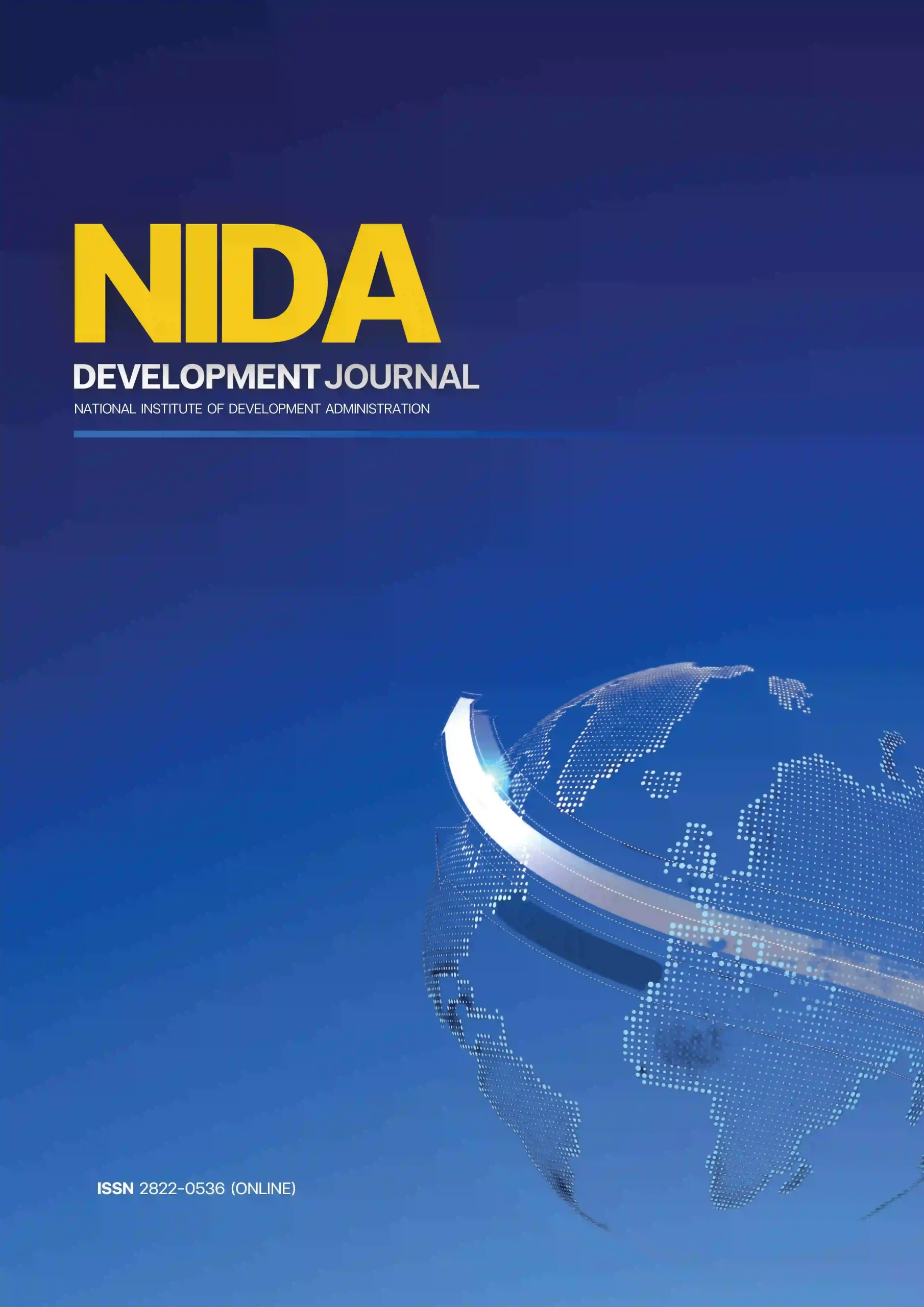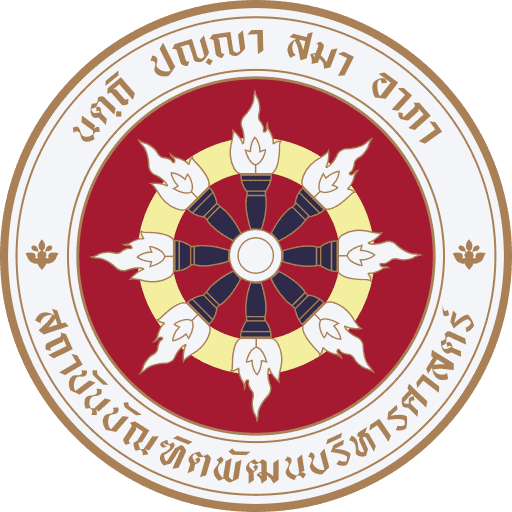
About the Journal
ISSN 2822-0536 (Online)
Focus and Scope
The NIDA Development Journal (NDJ) publishes papers that describe or synthesize research of direct relevance to development administration. Its main objective is to publish high quality,double-blind peer-reviewed papers using at least three referees that have not previously been published and that reflect the latest research in the area of policy, administration and development. The editors welcome a wide range of academic papers, including research articles, review articles, and book reviews.
Peer Review Process
- Creativity
- Academic contribution
- Completeness of the content and structure/components of research
- Language usage
- Clarity of hypotheses (if applicable)
- Clarity of the presentation and organization of the article
- Accuracy and correctness academically
- Conclusion and discussion
- Appropriate reference and citation
Publication Frequency
- Issue 1: January-June
- Issue 2: July-December
Publication Ethics
NIDA Development Journal committed to maintaining and applying high ethical standards in publication. Therefore, all parties involved must strictly follow the principles and standards of ethics in publication.
The NIDA Development Journal has a zero-tolerance policy for plagiarism, including self-duplication. To ensure compliance, all manuscripts undergo screening with plagiarism detection software prior to peer review. Our plagiarism management policy is as follows:
The plagiarism policy is as follows:
- Plagiarism ≤ 20%: The manuscript will be accepted for the editorial review process.
- Plagiarism between 21-25%: Authors will be granted a single opportunity torevise and resubmit their manuscript before further consideration.
- Plagiarism ≥ 25%: The manuscript will be immediately rejected and will notproceed to the editorial review stage.
Roles and Responsibilities of Editors
1. The journal editors shall review the manuscripts submitted for publication, examined the contents of the manuscript corresponding to the purpose and scope of the journal including the quality reviews of the manuscripts submitted before publication in an evaluation and acceptance procedure and retain the accuracy of academic work.
2. Each manuscript submitted for publication should be given unbiased consideration by the editors. The editor should evaluate his or her merits on academic grounds, without reference to the authors ‘ nationality, sex, religion, culture, politics or institutional affiliations. The editor’s decision to accept or reject manuscripts should be based on their significance, novelty and clarity, including the scope of the journal.
3. Editors shall have no interest in authors or reviewers and shall not use the articles and journals for their business or personal benefit including the protection of the intellectual property standard against business needs.
4. The editors shall not modify or change the manuscript contents and reviewer evaluations, including not blocking or interfering with information exchanged between reviewers and authors.
5. The editors shall strictly follow the processes of the journal and its procedures.
6. The editors should respect the journal standards and ensure that all details contained in the journal’s research article conform to the international ethical accreditation, including journal quality development and up-to-date journal database.
Roles and Responsibilities of Authors
1. Manuscripts submitted must not have been published or accepted for publication in any other journal and must not be under consideration for publication anywhere else.
2. Authors must avoid plagiarism. The authors must properly be referred to or quoted when using the works and/or words of others. By mentioning these works in the article and listing them in references, authors should acknowledge ideas and results previously publicized.
3. In the case of the use of animals, participants or volunteers in a research article, authors should ensure that the ethical principles are strictly implemented in compliance with applicable regulations and law, including the need for the consent to be obtained before data can be collected.
4. When submitting a manuscript authors are responsible for recognizing and disclosing financial and other conflicts of interest that might bias their work.
5. Authors must consent to copyright transferring to the journal prior to publication and not publication with any other journals after the NIDA Development Journal has been published.
6. The author of whose name the article has been published must be the person contributing the article.
Roles and Responsibilities of Reviewers
1. Reviewer’s articles should be examined on the basis of their academic quality. Personal opinions or prejudices without proof should not be used as criteria for review decisions. For the reviewers, the authors should not be of interest.
2. The academic work derived from peer reviews should not be used by the evaluators for personal benefit.
3. Reviewers should realize that the manuscripts should be reviewed objectively in the context of their expertise in the field.
4. If any plagiarized material, falsified data or similarities between the examined manuscript and another document are found either published or under consideration in another journal, the reviewer should immediately notify the editor.
5. Reviewers who agree to review a manuscript must complete their reviews within the specified time period. A reviewer should treat a manuscript sent for review as a confidential document. It should neither be shown to nor discussed with others.
Submission Preparation Checklist
As part of the submission process, authors are required to check off their submission’s compliance with all of the following items, and submissions may be returned to authors that do not adhere to these guidelines.
- The papers submitted for publication must be academic works that deal with the field of development administration: Policy, Administration, and Development.
- The types of contributions include Research Article, Journal Article, Review Article, Book Review, and Article Review.
- Each paper submitted for publication will be rigorously reviewed by the Editorial Team and at least three reviewers, who are knowledgeable in the field. A decision by the Editorial Team is considered final.
- The submitted paper must be unpublished work and must not be currently under consideration for publication elsewhere.
- The paper must contain the following:
– Title both in Thai and in English
– Names of all authors both in Thai and in English
– Abstract of 150-250 words both in Thai and in English
– Keywords of 3-5 words both in Thai and in English
(English in Time New Roman 14 pts, bold)
– The name of the author must be printed in
(Thai in Angsana New 16 pts, bold, italic) – Aligned right
(English in Time New Roman 12 pts, bold, italic) – Aligned right
The academic position, workplace and email address of the author specified as footnote at the end of the page with the symbol (*) according to the number of the authors.
– The title of “Abstract” and “Keywords” in
(Thai in Angsana New 16 pts, bold)
(English in Time New Roman 12 pts, bold)
– The abstract must be printed in
(Thai in Angsana New 16 pts)
(English in Time New Roman 12 pts)
– The content must be printed in
(Thai in Angsana New 16 pts)
(English in Time New Roman 12 pts)
– Main heading in
(Thai in Angsana New 18 pts, bold)
(English in Time New Roman 14 pts, bold)
– Sub heading in
(Thai in Angsana New 16 pts, bold)
(English in Time New Roman 12 pts, bold)
- The manuscript plus a submission form should be submitted via ThaiJO system (Thai Journal Online System) at https://www.tci-thaijo.org/index.php/NDJ.
- References must abide by the APA Style system and must be alphabetically shown. For Thai references, reference list must be added by translating Thai references into English.
Editorial Team
Managing Editor
Patthareeya Lakpetch
National Institute of Development Administration
Editorial Board
Edoardo Ongaro The Open
University, UNITED KINGDOM
Sunhyuk Kim
Korea University, SOUTH KOREA
Michael L. Kent
University of New South Wales, AUSTRALIA
Timothy Lee
Macau University of Science and Technology, MACAU
Timothy Jung
Manchester Metropolitan University, UNITED KINGDOM
Siwatt Pongpiachan
National Institute of Development Administration, THAILAND
Peerayuth Charoensukmongkol
National Institute of Development Administration, THAILAND
Pakpong Pochanart
National Institute of Development Administration, THAILAND
Administrative Committee
Tippawan Lorsuwannarat
Chairman
Wisakha Phoochinda
Member
Worachart Sirawaraphorn
Member
Kanchit Malaivong
Member
Wararit Panichkitkosolkul
Member
Sowatree Nathalang
Member
Patthareeya Lakpetch
Member
Pakpong Pochanart
Member
Editors Staffs
